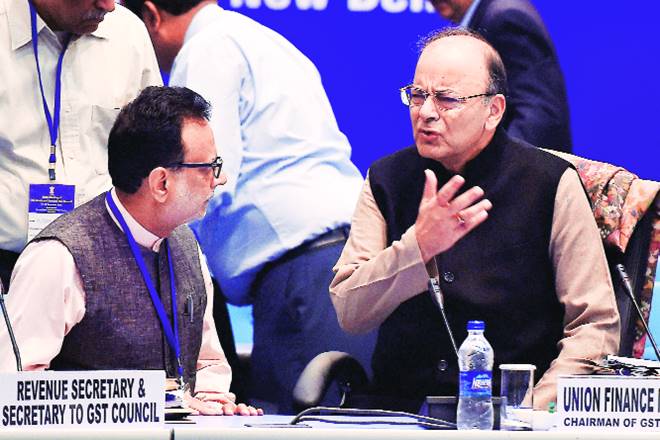GST Council meet cut short, no roll-out in April, 2017
The Financial Express
By FE Bureau
December 12, 2016 6:42 AM
Council meet cut short, draft laws can’t be tabled in current session

no Easy going: Union finance minister Arun Jaitley with revenue secretary Hasmukh Adhia at the 6th Goods and Services Tax (GST) Council meeting in New Delhi on Sunday.
The country’s journey that started more than seven years ago towards an indirect tax system that militates against cascading of taxes, seemed to prolong further on Sunday, after the sixth session of the Goods and Services Tax (GST) Council was cut short for want of any signs of a consensus on the sharing of administrative powers between the Centre and states. While the council was to meet on Monday too, it has now been convened on December 22-23.
With some states alleging the demonetisation move undermined the spirit of cooperative federalism that has hitherto guided the council, the earlier the relevant laws can be taken up by Parliament now is in the Budget session in January, as the ongoing Winter Session ends on December 16. Given that states also need to endorse the principal law that will define the central GST and state GST, there are very remote chances now of the proposed tax system being rolled out from April 1, 2017. As there is a constitutional compulsion to get the GST running latest by September 16, 2017, however, the new regime can’t be delayed beyond that.
When asked whether the contentious cross-empowerment issue will be resolved in the next session, finance minister Arun Jaitley said, “yes, if time permits,” adding that concluding the legislative agenda — that is, the fine-tuning of three draft laws — would be on top priority.
Kerala finance minister Thomas Isaac was, however, categorical in saying that he saw no possibility of the GST hitting the road before September. “We are unwilling to give up our position (that businesses with turnover up to Rs 1.5 crore should be under the states’ exclusive control. Unless the Centre (relents on) its stance that all service taxpayers should remain with it, there won’t be any compromise (by states).” He claimed that many states have hardened their positions post-demonetisation, referring to his state’s problems with the RBI directive undermining the cooperative banks. Jaitley said of the 195 sections of the model GST law, the first 99 have been finalised while it was decided to redraft one. The remaining chapters of this principal draft and two other draft laws — one pertaining to integrated GST (IGST) and the compensation for states — would also be finalised in the next session, Jaitley said, adding that he still “stood by the April 1 time-line for GST rollout.” “In any case, the discretion available (on GST commencement) is limited due to the Constitutional provision,” he remarked.
While the cross-empowerment issue is about how to divide the 10-million indirect tax assessee base between the Centre and states for administrative and audit purposes, some possible solutions to the vexed issue are already their on the council’s table. These include keeping assessees with turnover below Rs 1.5 crore with the states and the larger ones with the Centre, leaving below-Rs 1.5-crore-revenue taxpayers with states and others under cross-empowerment, retaining below-Rs 1.5-crore assessees with states and others under cross-empowerment but all service taxpayers with the Centre. Other two formulas under discussion are cross-empowerment where every year both the Centre and states will decide who will audit whom on the basis of risk parameters and a complete vertical division for 3 years, with a Centre-state ratio of 4:6; with a mirror image approach favouring the Centre for large taxpayers.
With demonetisation causing a shake-up in the economy, sources said the transition pains of GST could be deferred. “Even for the Centre, September would now look a more realistic timeline,” said a source.
It was decided earlier that in order to compute the states’ revenues losses from GST, a 14% annual growth over their 2015-16 revenue base (from relevant taxes) would be assumed. Although the states say they are worried about revenue losses due to demonetisation, it is not relevant to the GST compensation talks as 2015-16 was adopted as the base year, analysts said. “States don’t have anything to lose on the revenue front,” said Pratik Jain, partner and leader, indirect tax, PwC.
While industry in general is worried about an enabling non-profiteering clause in the model GST law and e-commerce firms fret about the retention of the tax collected at source obligation on them, both the Centre and states are inclined to endorse both. The anti-profiteering provision — which could be implemented only with the setting up of a designated authority — compels businesses to pass on the benefits from any reduction in output tax and rise in input tax credit as a result of GST roll-out. Analysts are also concerned about the likely compliance burden on large players in services sector in the GST regime. Even though the GST principle that tax will be paid where the consumption takes place is welcome, more clarity is required on the place of supply rules, they feel.